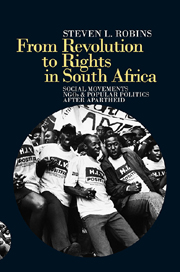 From Revolution to Rights in South Africa
From Revolution to Rights in South Africa Book contents
- Frontmatter
- Contents
- Foreword & Acknowledgements
- Abbreviations
- Zapiro cartoons
- 1 Introduction
- 2 Activist Mediations of ‘Rights’ & Indigeneous Identity
- 3 Citizens & ‘Bushmen’
- 4 ‘Civil Society’ & Popular Politics in the Postcolony
- 5 AIDS, Science & the Making of a Social Movement
- 6 Rights Passages from ‘Near Death’ to ‘New Life’
- 7 Sexual Rights & Sexual Cultures
- 8 Conclusion
- Bibliography
- Index
7 - Sexual Rights & Sexual Cultures
AIDS Activism, Sexual Politics & ‘New Masculinities’ after Apartheid
Published online by Cambridge University Press: 05 April 2013
- Frontmatter
- Contents
- Foreword & Acknowledgements
- Abbreviations
- Zapiro cartoons
- 1 Introduction
- 2 Activist Mediations of ‘Rights’ & Indigeneous Identity
- 3 Citizens & ‘Bushmen’
- 4 ‘Civil Society’ & Popular Politics in the Postcolony
- 5 AIDS, Science & the Making of a Social Movement
- 6 Rights Passages from ‘Near Death’ to ‘New Life’
- 7 Sexual Rights & Sexual Cultures
- 8 Conclusion
- Bibliography
- Index
Summary
Introduction
The AIDS pandemic in South Africa has contributed towards prising open questions on sexuality and sexual rights in ways that were unprecedented in the past. Partly as a result of exposure to HIV/AIDS prevention programmes driven by the international health agencies, the state, NGOs and social movements such as the Treatment Action Campaign (TAC), parents and politicians are increasingly compelled to talk openly about sex and sexual rights in the home and in public domains. Meanwhile gender, gay, AIDS and anti-rape activists have responded to the pandemic by highlighting the need to activate and realise the gender and sexual rights provisions in South Africa's progressive constitution. However, the AIDS pandemic and the promotion of new sexual and gender rights has also triggered a conservative backlash from religious leaders and ‘traditionalists’. It is within this contested setting that new forms of AIDS activism and sexual citizenship are emerging.
Modern democracies everywhere are increasingly concerned with questions of sexual equality between homosexuals and heterosexuals, as well as between men and women (Fassin 2006). ‘The politicisation of sexuality’, Eric Fassin concludes, ‘partakes in a broader process of denaturalisation of the social order [and is] therefore an object of democratic debate … This is why sex is the [latest] frontier in the democratic definition of our societies’ (ibid.: 92).
- Type
- Chapter
- Information
- From Revolution to Rights in South AfricaSocial Movements, NGOs and Popular Politics After Apartheid, pp. 144 - 164Publisher: Boydell & BrewerPrint publication year: 2008


